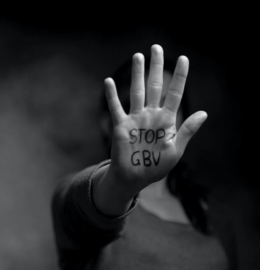
President Cyril Ramaphosa says the violence perpetrated by men against women and children is a devastating social problem that can only be solved by every part of society working together.
While the latest crime statistics show a slight year-on-year decline in sexual offences, the President said the country has not yet made significant progress in reducing the appalling levels of gender-based violence.
“That is why government has been working closely with civil society, business, labour and other formations on a society-wide response that harnesses all the resources and energies at our disposal.
“The National Strategic Plan (NSP) on Gender-Based Violence and Femicide is the product of an inclusive social process and its implementation is our collective responsibility,” he said.
The President was responding to oral questions during a hybrid sitting in the National Assembly on Tuesday.
The Leader of the Opposition (DA), John Steenhuisen, had asked the President to provide details of the steps he will take, in addition to the implementation of the NSP on GBV and Femicide to ensure that women and girls are protected from GBV and perpetrators of gender-based crimes are prosecuted swiftly.
The President said government is fully committed to the full and urgent implementation of the NSP, which is a 10-year plan in its third year of implementation.
“We have started making progress in putting the necessary social infrastructure in place to respond more effectively to gender-based violence.
“To this end, 23 Rapid Response Teams have been established in the Eastern Cape, KwaZulu-Natal, Northern Cape, Mpumalanga and Gauteng,” he said.
President Ramaphosa said these teams are multi-stakeholder structures at the district, local and ward levels to coordinate responses to gender-based violence and femicide.
The teams comprise senior frontline officials, such as police station commanders, senior social workers, representatives from Thuthuzela Care Centres and Victim Empowerment Centre officials.
“They work with community organisations and individuals to report suspected cases, clean up unsafe spaces and act to reduce the potential for gender-based violence by, for example, ensuring that liquor outlets do not stay open after operating hours.
“We have strengthened the criminal justice system by enacting the Sexual Offences and Related Matters Amendment Act and the Criminal and Related Matters Amendment Act,” the President said.
Among others, these Acts strengthen the protection of children and other vulnerable persons and make vital changes to the parole system, giving complainants the right to make representations on certain parole issues.
The President said that the new provisions tighten conditions with respect to the granting of police bail.
“Courts will now impose tougher sentences in cases of murder or attempted murder of children or in femicide and domestic homicide cases.
“Rape perpetrated in domestic relationships, rape of a child under 18 years, gang rape and serial rape will result in life imprisonment,” he said.
Justice
Through the Thuthuzela Care Centres, the President said government is working quickly to ensure that GBV survivors can access efficient and sensitive criminal justice services in an accessible, responsive and gender-inclusive manner.
These centres are also proving effective in improving conviction rates.
The current conviction rate for matters emanating from these centres is 76%, up from 60% in 2010.
The President highlighted that the Sexual Offences and Community Affairs unit in the National Prosecuting Authority (NPA) achieved a conviction rate of 94% in femicide prosecutions and 74% cent in sexual offences cases in the last financial year.
“It is not enough to arrest, prosecute and sentence perpetrators of gender-based violence. Our shared responsibility is to prevent such violence and build a society where women and children feel and are safe,” the President said.
One of the initiatives in this respect is a national prevention GBVF programme called ‘What about the Boys?’, which is a partnership of the Department of Basic Education, the Chemical Industries SETA and the private sector.
The President said that about 10 000 boys in grades 8 - 12 are now part of the programme.
“They are encouraged to reimagine traditional ideas of masculinity, learn how to manage their emotions and create healthy minds and bodies.
“We are also working with partners to promote the economic empowerment of women and thereby reduce their vulnerability to abuse,” the President said.
Some of the interventions include gender-responsive budgeting, preferential procurement for women-owned enterprises, promoting the participation of women in business supply chains, and ensuring that women are well represented in the labour market.
The President told members of Parliament that government will convene the second Presidential Summit on Gender-Based Violence and Femicide later this year to reflect on what has worked and not worked.
The Presidential Summit will also look at what further actions need to be taken to accelerate meaningful change in the lives of all women and children in the country.
“We know that we will not win this battle overnight. Building a safe and violence-free country, particularly for women and children, means healing our nation.
“It means restoring healthy respect for our common humanity and rooting the values of our Constitution in ourselves, in our homes and in our communities,” the President said. – SAnews.gov.za


